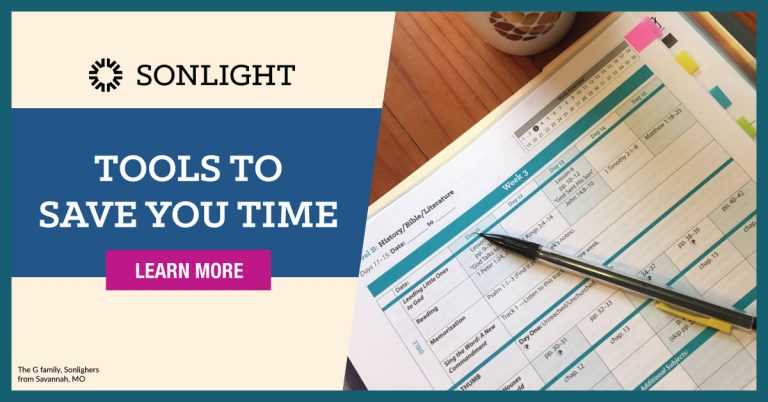I’m going to be totally honest right off the bat here. I never experienced those comments. You know the ones…those comments from well-meaning friends, family, and strangers who question your ability to homeschool because of your type of college degree or lack thereof.
You see, I am a former public school teacher, and I have a degree in early childhood education. It still sits on my shelf, a small reminder of those four years of transition into adulthood. I’m really quite thankful that I have it, but I try not to allow it to be a crutch for my current gig. Surprisingly, I really don’t bring a lot of my college education into our homeschool. Here are a few reasons why you don’t need a teaching degree to homeschool.

"We have used Sonlight since the beginning and absolutely love it! Homeschooling offers us the ability to spend more time with our siblings and pets, delve into our interests, and truly live a fuller life. Sonlight has helped make homeschool our greatest adventure!"
—Elizabeth P. of Leland, NC
1. Teachers Teach the Masses
I applaud public school teachers. Having been among the ranks for a few treasured years, I remember the challenges we endured and the victories we celebrated.
Public school teachers are special because they have learned how to teach a lot of children at one time. They teach to multiple learning styles in each of their lessons. They specialize in testing students to see which group to place them in. Licensed teachers study data to find trends and gaps within a set of students.
A homeschool mom or dad simply does not need these skills. First, with only a handful of students rather than a classroom full, we are able to give one-on-one instruction. You may not need to work in a kinesthetic link to your lesson if your child is mostly an auditory learner. If you test your child, you will only need to examine one set of results. This does not require a degree. Often, you don't need to test him because you know exactly what he knows since you've been working one-on-one with him.
2. Teachers Develop Curriculum
Licensed teachers have learned how to develop curriculum. They spend much of their professional development time aligning curriculum maps. They analyze the order in which concepts need to be taught, and they assure that every state standard is taught at some point. This is important work in public schools. Teachers need to show that there is a continual and logical progression of learning with minimal learning gaps.
However, in a homeschool, this is generally unnecessary. Many qualified people at companies like Sonlight have already done the hard work for you. You just follow the curriculum that is laid out in your Instructor’s Guide. This requires no degree. In fact, Sonlight even includes plenty of notes to help you along in case you get stuck.
3. Even Teachers Have Areas of Expertise
Most teachers hold a degree applicable to a certain level of education. When I went through college, my degree was listed as Pre-K through 4th grade. I was officially licensed only for those age levels. So does that mean that I would have been completely lost if I had been assigned a fifth grade classroom? Not at all. In fact, all I would have had to do is pass a test, and I would have my next level of certification.
In a similar vein, I didn’t panic when my oldest left fourth grade. I didn’t believe that I was suddenly an inadequate teacher once he left my level of formal expertise. Homeschooling one grade is very similar to homeschooling another.
- Simply follow the curriculum.
- Facilitate learning, finding the resources to help when you can’t.
The great thing about homeschooling is that the parent gets to learn alongside the child. You grow and gain confidence right along with your child.

4. Teachers Don’t Have a Degree in the Study of Your Child...You Do
Yes, public school teachers receive training to teach all children, and many of them do an excellent job of it. However, you are the expert on your children.
- You have spent hours on end studying them.
- You live with them.
- You know their quirks, their weaknesses, and their strengths.
No one awards a degree in college for the study of your child, yet no one knows your child better than you. And that knowledge, combined with your love, makes you a great teacher.
5. Teachers Are Life-Long Learners...
....and you are too! As soon as you signed up to homeschool, you committed to being a life-long learner. In fact, chances are you will learn more than you ever bargained for, and that will make you hungrier to learn even more. Your child will catch that same hunger, and before you know it, you’ll both be hooked on learning.
Public school teachers log somewhere around 60+ hours of professional development each year. Teachers are required to attend these continuing education opportunities.
Guess what? Countless homeschool moms and dads log even more hours of continuing education every single year!
- Listening to podcasts
- Watching videos that tell you how to enrich learning
- Reading books about homeschooling
- Researching your child's special needs
- Going to conventions
- Asking advice of veteran moms
...these are all professional development for homeschoolers.
Reading this blog right now counts as professional development because you care about getting better at this homeschooling gig, right?! Again, I have a tremendous amount of respect for public school teachers. What they do each day is admirable, but it doesn’t discount what you do every day.
I am the wife of a children’s pastor’s, and we talk a lot about being qualified. Many people don’t feel qualified to volunteer in the children’s department for one reason or another. We often remind them the same thing I want to remind you of now:
God doesn’t always call the qualified. However, he does qualify those whom He calls.
Homeschool moms and dads, if He has called you to this life, you are well-qualified.
Imagine having a personal homeschool mentor who plans and organizes your entire homeschool year, giving you customizable schedules, complete lesson plans, pertinent activities, and thoughtful discussion questions. This is exactly the support you get with a Sonlight Instructor's Guide. Or download the Sonlight Connections app to access support!









Great insights! This article beautifully explains how a teaching degree isn’t required for successful homeschooling. Encouraging and informative!
So glad you are encouraged!
Just thank you for this encouragement!!!
Greetings from Madagascar,
Anita